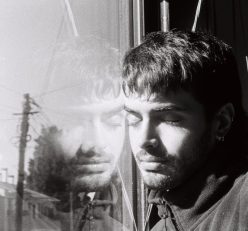1st Program – Fragments of a musical inquiry in Vila Verde de Ficalho (Lower Alentejo – 9th of August 1971
This is the first complete episode I see of any made by Giacometti. Before, I only watched fragments available on Youtube of displaced episodes. Giacometti is seen before the interviewee, asking questions in an inquest format (name, age, homeland, etc.). You can see the whole team of RTP around the place: people from the city, dressed in the latest fashion, while António da Assunção Lopes, the subject under review, and another compadre hanging there, dressed in old, dark and antiquated clothes. We are in Via Verde de Ficalho, land of the Baixo Alentejo (Serpa, Beja).
Still, about the production, we observe situations of social consciousness that, although almost insignificant and insignificant, are, in the eyes of an academic and enthusiast of others that such as the case of Stephen Feld, of great importance. They constitute a symbolic immensity for the whole of production and the entire political-social context of the early 70s. It symbolises the participation of the people in the practical realisation of the freedom of speech (perhaps) so necessary at that time. Antonio’s companion is one of the actors who allows the recording of the subject’s voice. Along with the members of RTP, he will enable the extension of the cable of Nagra IV-s (analogue tape label).
At the same time, I wonder about the editorial intentions of the image and sound assembler: there were some “silences”, the recordings were kept complete, listening to the old-fashioned metal machinery rubbing the earth and itself, frogs, steps… It’s not just the voice. It’s all that sounds. That is, it legitimises the natural environment of that record.
"Moda da Lavoura" (Farming Moda, moda is a way of singing) of Vila Verde de Ficalho, performed by António da Assunção Lopes Nestes campos solitários Onde a desgraça me tem, Brado, ninguém me responde, Olho, não vejo ninguém. A vida do almocreve É uma vida arriscada, Ao descer uma ladeira, Ao cerrar uma carrada! Translation: In these lonely fields Where misfortune has me, I shout, no one answers me, I look, I see no one. The life of the almocreve* It’s a risky life, Going down a hill, Close up a bunch! *almocreve: "Cargo-carrying individual (whether or not on periodic journeys)."(Dicionário, 2022).
2nd Program – Santa Cruz celebration in Aldeia da Venda: Upper Alentejo – August 23, 1971.
“In this atmosphere, as if emerging outside the present time, an orchestra from the neighbourhood attacks, without transition, a pop song: the youth prepares for a country dance, which will last the night away.” (Giacometti, 1971).
This is the same celebration nowadays. Still resisting.
3rd Program – Fragments of an inquiry in Salir: Algarve, 6th of September 1971
Beautiful program! Nothing is more beautiful than seeing the people in improvisation, failure and repetition. It is the genuineness of culture free from folklorisation. In this episode recorded in Salir, a man whose function already refers to hidden times immerses the people in hallucinations told of things never lived and misrepresented experiences. But the freedom of expression is reflected in him. RTP gave him this opportunity, and Giacometti heard it. On the other hand, José de Sousa, who had travelled through the ethnomusicologist lands, failed to play the mischievous travessa flute and lamented its insufficient and worn technique.
However, the relevance centres on recording the tale, which Alfredo, who was in front of Salir’s people sitting on the stairs, understood to roll the tape and record as much as he could. Today, decisions like this are seen as easy. In the 1970s, there was a budget for everything, and indeed, film tape had its limits. Alfredo Tropa, then the visual director of Giacometti’s ethnographic decisions, decided to take this experience to the air and make it tangible for all Portuguese people.
4th Program – A Oração das Almas em São Bento do Ameixial (Translation: The Souls Prayer in São Bento do Ameixial): Upper Alentejo – 20th of November 1972
The ephemerality of traditions. The inability to continue. In the end, Giacometti comments, “It is necessary and urgent that the systematic collection of our regional music is processed between us and by all available means. By losing the physiognomic traits of our musical tradition, we will have consciously obliterated and forever, living portions of a reality that our people express with strength and truth. If this is the case, it is clear that any future analysis of this same reality must necessarily lead to serious shortcomings to the detriment of this truth.” (Giacometti, 1972).
References:
In: Priberam Dicionário. 2022. Almocreve. [online] Priberam. Available at: <https://dicionario.priberam.org/almocreve> [Accessed 12 May 2022].
Giacometti, M., 1971. A Festa da Santa Cruz na Aldeia da Venda. Povo Que Canta. RTP.
Giacometti, M., 1972. A Oração das Almas em São Bento do Ameixial. Povo que Canta. RTP.

